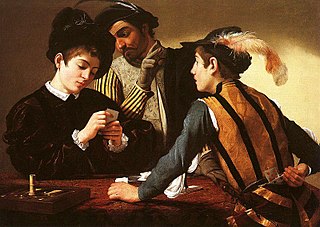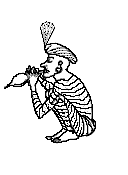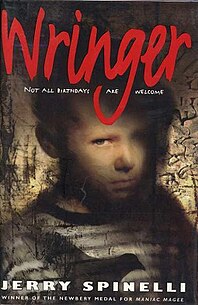This page is based on this
Wikipedia article Text is available under the
CC BY-SA 4.0 license; additional terms may apply.
Images, videos and audio are available under their respective licenses.

Penn & Teller are American magicians and entertainers who have performed together since the late 1970s, noted for their ongoing act that combines elements of comedy with magic.

Sleight of hand refers to fine motor skills when used by performing artists in different art forms to entertain or manipulate. It is closely associated with close-up magic, card magic, card flourishing and stealing.

Coin magic is the manipulating of coins to entertain audiences. Because coins are small, most coin tricks are considered close-up magic or table magic, as the audience must be close to the performer to see the effects. Though stage conjurers generally do not use coin effects, coin magic is sometimes performed onstage using large coins. In a different type of performance setting, a close-up coin magician will use a large video projector so the audience can see the magic on a big screen. Coin magic is generally considered harder to master than other close-up techniques such as card magic, as it requires great skill and grace to perform convincingly, and this takes a lot of practice to acquire.

Little Boy Lost is a dramatic novel by Marghanita Laski that was published in 1949. It was republished in 2001 by Persephone Books.

Val Valentino is an American magician.

Trick comprises a comedic Japanese television drama and movie series, as well as associated comic books, novelizations and meta-fiction novels about a failed magician and an arrogant physicist who debunks fraudulent spiritualists. It stars Hiroshi Abe and Yukie Nakama and is shown on TV Asahi. It was created by Japanese director Yukihiko Tsutsumi.

Stage or street magic has a long history in India. Popular tricks include the rope trick, Indian basket, and Indian cups and ball.
Stage illusions are large-scale magic tricks. As the name implies, stage illusions are distinct from all other types of magic in that they are performed a considerable distance away from the audience, usually on a stage, in order to maintain the illusion. Examples of stage illusions include sawing a woman in half and Lady-to-Tiger.

The Tarbell Course in Magic is a notable encyclopedia of magic amongst professional and amateur magicians. It has eight volumes; the first five were part of the original home-study correspondence course compiled in 1928 by Dr. Harlan Tarbell, the remaining three volumes being added on later.
Platform magic is magic that is done for larger audiences than close-up magic and for smaller audiences than stage magic. It is more intimate than stage magic because it doesn't require expensive, large-scale stage equipment and can thus be performed closer to the audience and without a stage. Many of the tricks performed by platform magicians are sufficiently angle-sensitive as to make them impossible to perform as micromagic. Most working magicians are parlor/platform magicians.

Magic, along with its subgenres of, and sometimes referred to as illusion, stage magic or close up magic is a performing art in which audiences are entertained by staged tricks or illusions of seemingly impossible feats using natural means. It is to be distinguished from paranormal magic which are effects claimed to be created through supernatural means. It is one of the oldest performing arts in the world.
Andy Segal, nicknamed "the Magic Man", is a trick-shot pool champion from Huntington, New York. He began as a professional nine-ball player in the 1990s, and was a regular on the Camel Pro Billiard Tour before switching to trick-shot competition in 2002. A full-time pro player since 2007, Segal holds three world records in artistic billiards. He is known for his television competition appearances on ESPN, and has won many such events, including Trick Shot Magic, the World Cup of Trick Shots, the WPA World Artistic Pool Championship, and the Masters Artistic Pool Championship. Segal also performs trick shot exhibitions all over the world, and in films and television.

A magic store is an establishment which sells materials for performing magic tricks. Magic shops often also sell practical jokes and novelty items, and frequently serve as informal gathering places for amateur magicians, with some hosting organized magic clubs.

Henry Ridgely Evans (1861–1949) was an American amateur magician and magic historian.

Moein Al Bastaki is a magician, mentalist and illusionist from Dubai, UAE. Moein is best known for his street magic, large illusions, mentalism and performing close up magic for international and Arabic celebrities.

Shin Lim is a Canadian-American magician of Han Chinese heritage, recognized for his use of card manipulation and sleight of hand. He is known for elaborate close-up card magic routines, during which he remains silent with the tricks set to music. He is self-taught, having learned most of his skills from watching YouTube. Since then, he has shared some of his techniques on YouTube.














